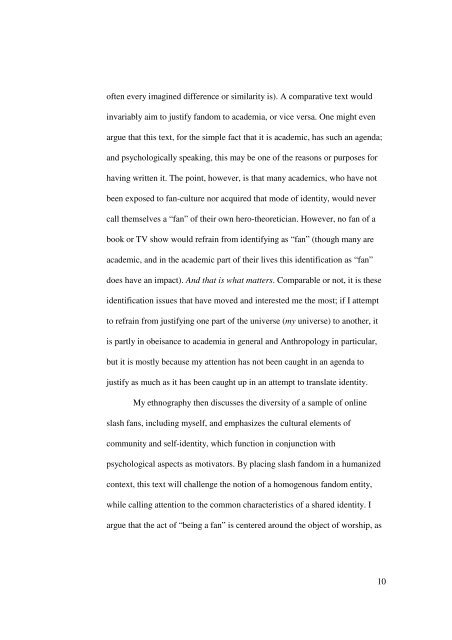Girls who like Boys who like Boys – Ethnography of ... - Yuuyami.com
Girls who like Boys who like Boys – Ethnography of ... - Yuuyami.com
Girls who like Boys who like Boys – Ethnography of ... - Yuuyami.com
You also want an ePaper? Increase the reach of your titles
YUMPU automatically turns print PDFs into web optimized ePapers that Google loves.
<strong>of</strong>ten every imagined difference or similarity is). A <strong>com</strong>parative text would<br />
invariably aim to justify fandom to academia, or vice versa. One might even<br />
argue that this text, for the simple fact that it is academic, has such an agenda;<br />
and psychologically speaking, this may be one <strong>of</strong> the reasons or purposes for<br />
having written it. The point, however, is that many academics, <strong>who</strong> have not<br />
been exposed to fan-culture nor acquired that mode <strong>of</strong> identity, would never<br />
call themselves a “fan” <strong>of</strong> their own hero-theoretician. However, no fan <strong>of</strong> a<br />
book or TV show would refrain from identifying as “fan” (though many are<br />
academic, and in the academic part <strong>of</strong> their lives this identification as “fan”<br />
does have an impact). And that is what matters. Comparable or not, it is these<br />
identification issues that have moved and interested me the most; if I attempt<br />
to refrain from justifying one part <strong>of</strong> the universe (my universe) to another, it<br />
is partly in obeisance to academia in general and Anthropology in particular,<br />
but it is mostly because my attention has not been caught in an agenda to<br />
justify as much as it has been caught up in an attempt to translate identity.<br />
My ethnography then discusses the diversity <strong>of</strong> a sample <strong>of</strong> online<br />
slash fans, including myself, and emphasizes the cultural elements <strong>of</strong><br />
<strong>com</strong>munity and self-identity, which function in conjunction with<br />
psychological aspects as motivators. By placing slash fandom in a humanized<br />
context, this text will challenge the notion <strong>of</strong> a homogenous fandom entity,<br />
while calling attention to the <strong>com</strong>mon characteristics <strong>of</strong> a shared identity. I<br />
argue that the act <strong>of</strong> “being a fan” is centered around the object <strong>of</strong> worship, as<br />
10


